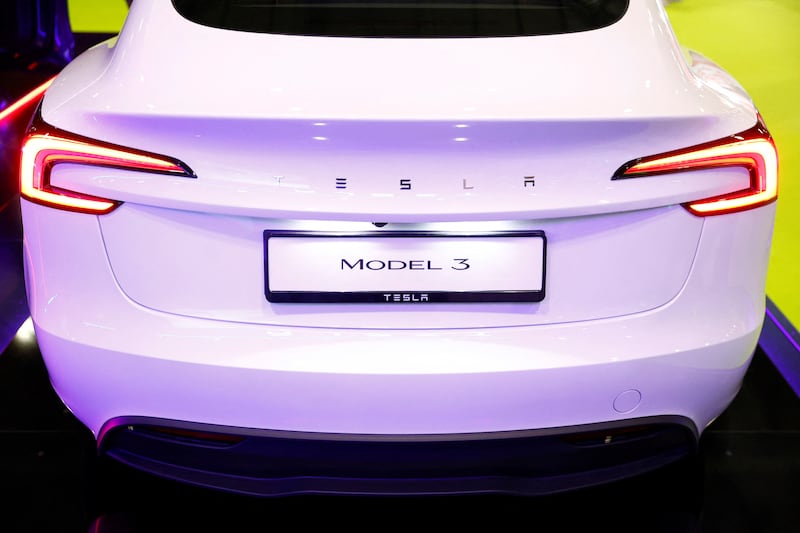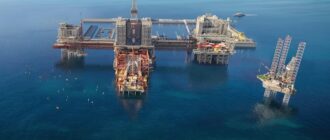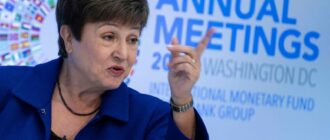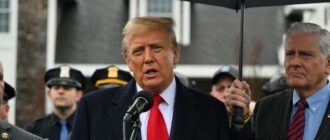EV maker’s deliveries fell year-on-year for first time since the last quarter of 2020

The National Listen In EnglishListen in ArabicPowered by automated translation
Live updates: Follow the latest news on Israel-Gaza
Tesla’s deliveries fell for the first time in four years after the carmaker faced disruptions caused by Houthi rebel strikes in the Red Sea and an attack at its German factory.
The electric vehicle maker said on Tuesday that it produced 433,371 cars last quarter, but delivered only 386,810. That is about an 8.5 per cent drop from deliveries during the January-March period last year.
It marked the first time Tesla reported a year-on-year decline since the Covid-19 pandemic affected deliveries in 2020.
Tesla said deliveries were affected by shipping diversions caused by Houthi attacks in the Red Sea and an arson attack at the company’s Gigafactory in Berlin. Tesla also said the production ramp-up of the updated Model 3 partially affected the decline.
Shares in Tesla fell by more than 5 per cent during trading on Tuesday.
READ MOREAre Tesla's days in the Magnificent Seven over?Will Rivian's new and low-priced R2 and R3 make it a match for Tesla?
Tesla had predicted a “notably slower” growth in sales this year due to it being between two “growth waves,” founder Elon Musk said in January.
Deepwater Management managing partner Gene Munster wrote that high interest rates and less demand for electric vehicles contributed to Tesla’s “ugly” first-quarter numbers.
However, he said he believes Tesla “is on the right track and this storm will pass”.
“EVs are a better way to move a car and autonomy is a better way to get around. Tesla is investing in that future while other car makers are slowing their investment,” he said on X.
Meanwhile, Wedbush managing director Dan Ives said Tesla’s deliveries were an “unmitigated disaster”.
Mr Ives said Mr Musk must “turn this around and reverse the black eye” Tesla suffered this quarter.
“Otherwise darker days ahead,” he wrote.
Tesla is also facing increased competition in China, where car maker BYD overtook the Austin, Texas, company as the largest electric vehicle maker in the fourth quarter of last year.
BYD reported on Monday that it sold about 300,000 EVs last quarter.
California EV maker Rivian announced it delivered 13,588 vehicles last quarter, slightly down from its deliveries in the final three months of last year.
Tesla is scheduled to hold a call with investors on April 23.
Industry analysts said the EV demand growth that they predicted two years ago has not materialised from the consumer end, particularly in more developed markets where the growth curve has flattened after the initial boom.
“This can largely be attributed to the inconvenience associated with owning an EV at present,” Thomas Monteiro, senior analyst at Investing.com, told The National.
“High-end consumers are still hesitant to rely on something that isn’t as practical as traditional gas-powered cars, and thus, they await the next innovation that will elevate the EV market.”
Mr Monteiro said Tesla’s recent delivery numbers reflect a broader trend in the global EV market. Notably, EVs remain the only segment in the technology space with negative returns this year, he added.
Drop in vehicle deliveries present a new “challenge” for billionaire businessman Mr Musk, as further price cuts are constrained by current production costs.
“Tesla’s path forward may lie beyond the confines of the EV space and into innovation,” Mr Monteiro said.
“Introducing new and exciting alternatives and offerings to enhance the user experience could reignite demand growth for Tesla.”
Updated: April 03, 2024, 12:49 PM










